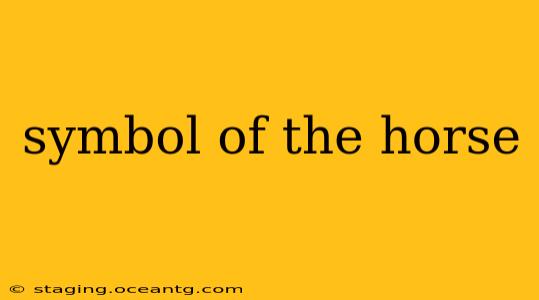The horse, a majestic creature of power and grace, has held profound symbolic meaning across diverse cultures and throughout history. Its representation transcends mere depiction; it embodies a complex tapestry of ideas and emotions, often reflecting the values and beliefs of the societies that venerate it. This article delves into the rich symbolism of the horse, exploring its various interpretations and the enduring legacy it holds in our collective imagination.
What are the different meanings of the horse symbol?
The symbolism of the horse is multifaceted and often context-dependent. However, some recurring themes emerge:
-
Power and Strength: The horse's raw physical power is undeniable. Its ability to carry heavy loads and its speed have consistently linked it to strength, both physical and spiritual. In many cultures, horses are associated with leadership, dominance, and the ability to overcome obstacles.
-
Freedom and Wildness: The untamed spirit of the horse often represents freedom and independence. Its ability to roam vast landscapes freely symbolizes the untamed aspects of nature and the human spirit's yearning for liberation. The image of a wild mustang, for example, is often used to represent unconquerable spirit and boundless energy.
-
Spirituality and the Soul: In some belief systems, the horse is linked to the soul or spiritual essence. Its connection to the wind and its graceful movement often symbolize the ethereal and the transcendent. This spiritual aspect often manifests in mythology and folklore, where horses serve as messengers between the mortal and divine realms.
-
Nobility and Elegance: The elegant gait and refined appearance of certain horse breeds have contributed to their association with nobility, grace, and sophistication. Throughout history, horses have been ridden by royalty and elites, further reinforcing this perception.
-
Fertility and Abundance: In certain agricultural societies, horses have been associated with fertility and the abundance of the harvest. Their role in plowing fields and their association with the cycles of nature contribute to this interpretation.
What does a horse symbolize in different cultures?
The meaning of the horse symbol can vary significantly across different cultures:
-
Native American Cultures: Different tribes hold diverse beliefs, but horses often represent freedom, power, and spiritual connection to the land. They are frequently depicted in ceremonial dances and art.
-
Celtic Mythology: Horses are often associated with the Otherworld and spiritual journeys. They are sometimes seen as powerful guides or guardians.
-
Greek Mythology: Horses were closely linked to gods and goddesses, particularly Poseidon and Apollo. They were viewed as powerful, noble creatures, often associated with warfare and heroism.
-
Chinese Culture: The horse represents strength, endurance, and freedom. It's one of the twelve animals of the Chinese zodiac, representing those born in the year of the horse as dynamic and energetic.
What does a white horse symbolize?
The white horse, across many cultures, carries significant symbolic weight, often representing:
-
Purity and Innocence: The color white is universally associated with purity and innocence, making the white horse a powerful symbol of these qualities.
-
Spirituality and Divinity: In religious contexts, the white horse is sometimes linked to divine beings or spiritual messengers. Its association with light and purity reinforces this sacred significance.
What does a black horse symbolize?
In contrast to the white horse, the black horse often holds a more ambiguous symbolism, sometimes representing:
-
Mystery and the Unknown: The darkness associated with black often links the black horse to the unknown, mystery, and the subconscious.
-
Death or Darkness: In some contexts, the black horse can symbolize death or the underworld, representing a transition or a journey into the unknown. However, it can also represent power and strength, just like a horse of any color.
What does a horse represent spiritually?
Spiritually, the horse can represent:
-
Personal Power: Connecting with the energy of a horse can help individuals tap into their inner strength and resilience.
-
Freedom and Liberation: The horse’s untamed spirit can inspire a sense of freedom and liberation from limitations.
-
Spiritual Journey: The horse can be a symbol of the soul’s journey toward growth and transformation.
The symbolism of the horse is a vast and compelling subject, offering a unique lens through which to understand diverse cultures and belief systems. Its enduring presence in art, literature, and mythology reflects its deep and lasting impact on the human imagination. Whether representing power, freedom, or spirituality, the horse continues to inspire awe and wonder.
